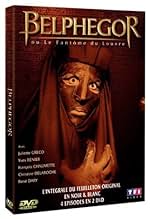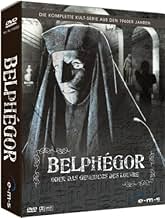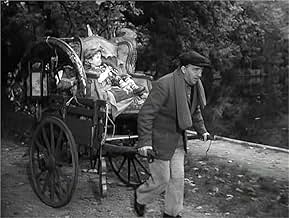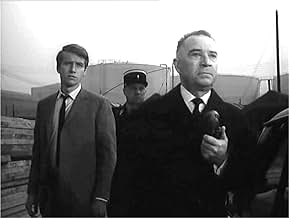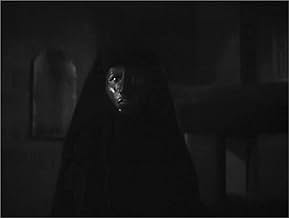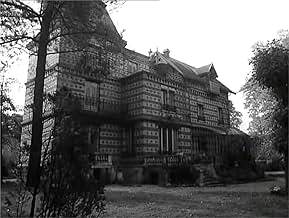IMDb RATING
7.4/10
490
YOUR RATING
A mysterious phantom appears in the Musée du Louvre in Paris at night. Neither the guards nor the police are able to arrest it. A curious young man tries to break the ice and discover what d... Read allA mysterious phantom appears in the Musée du Louvre in Paris at night. Neither the guards nor the police are able to arrest it. A curious young man tries to break the ice and discover what drives the creature and the background activities.A mysterious phantom appears in the Musée du Louvre in Paris at night. Neither the guards nor the police are able to arrest it. A curious young man tries to break the ice and discover what drives the creature and the background activities.
Browse episodes
Featured reviews
"Belphégor" starts with an old man, who in over 30 years collected newspaper clippings about extraordinary phenomena. To protect them from the fallout of a possible war, he somehow managed to enclose them in tin cans. Is this scene necessairy? No. Is it memorable? Yes. This is how this miniseries works, it doesn't use the highway, it takes a scenic route.
Case in point: Belphégor. He isn't doing much. He is supposed to find some alchemical secret in the Louvre. There are some supernatural things happening, showing that he is a necessity for this task, but most of it remains a mystery. That's probably for the best, because dragged into the light these things tend to look rather stupid. In the end, the details don't matter. We've got the iconic outfit, the iconic mask, the inscrutable behavior. He is a phantom, other-worldly, he is the reason why people still remember this show. He is the main attraction, but he is far from being the only one.
Unlike too many TV movies from the 60s, "Belphégor" is never tediously slow or boring. Unexpected twists always keep the viewers interested and wondering. There are quite a few strange, remarkable scenes and there are some great actors, like René Dary, whose inspector Ménardie is very reminiscent of Jean Gabin's jovial and likable characters. The last name-less Sylvie, whose first screen role was in 1912, as the unfathomable, quirky Lady Hodwin. François Chaumette as the insidious millionaire Boris Williams. The museum watchman Gautrais (Paul Crauchet), called glug-glug by his colleagues. The leading actor Yves Rénier is very convincing as the pretty boy Bellegarde. And the legendary Juliette Gréco plays her role really well, too.
The silent version from 1927 - also with a runtime of more than 4 hours - is completely different. There is nothing supernatural, no good reason for the use of Belphégor at all. Why turning something that should have and could have been done without attracting any attention into a media sensation? It is close to the novel by Arthur Bernède, a rather trivial crime story that absolutely needed a spectacular gimmick to attract any attention. Belphégor 1965 wins triumphantly.
Belphégor 2001 is just another version of "The Mummy". The way the third variant of the Belphégor outfit is introduced, doesn't make sense at all, but without it there wouldn't have been any connection to the previous two "Belphégors". At least, for the first time the Louvre is real, and there is a real (CGI-) phantom. And for a few seconds there is a cameo by Juliette Gréco, la jolie môme.
Belphégor 1965 is an original piece of art. There will never be a better version and there is no need for one.
Case in point: Belphégor. He isn't doing much. He is supposed to find some alchemical secret in the Louvre. There are some supernatural things happening, showing that he is a necessity for this task, but most of it remains a mystery. That's probably for the best, because dragged into the light these things tend to look rather stupid. In the end, the details don't matter. We've got the iconic outfit, the iconic mask, the inscrutable behavior. He is a phantom, other-worldly, he is the reason why people still remember this show. He is the main attraction, but he is far from being the only one.
Unlike too many TV movies from the 60s, "Belphégor" is never tediously slow or boring. Unexpected twists always keep the viewers interested and wondering. There are quite a few strange, remarkable scenes and there are some great actors, like René Dary, whose inspector Ménardie is very reminiscent of Jean Gabin's jovial and likable characters. The last name-less Sylvie, whose first screen role was in 1912, as the unfathomable, quirky Lady Hodwin. François Chaumette as the insidious millionaire Boris Williams. The museum watchman Gautrais (Paul Crauchet), called glug-glug by his colleagues. The leading actor Yves Rénier is very convincing as the pretty boy Bellegarde. And the legendary Juliette Gréco plays her role really well, too.
The silent version from 1927 - also with a runtime of more than 4 hours - is completely different. There is nothing supernatural, no good reason for the use of Belphégor at all. Why turning something that should have and could have been done without attracting any attention into a media sensation? It is close to the novel by Arthur Bernède, a rather trivial crime story that absolutely needed a spectacular gimmick to attract any attention. Belphégor 1965 wins triumphantly.
Belphégor 2001 is just another version of "The Mummy". The way the third variant of the Belphégor outfit is introduced, doesn't make sense at all, but without it there wouldn't have been any connection to the previous two "Belphégors". At least, for the first time the Louvre is real, and there is a real (CGI-) phantom. And for a few seconds there is a cameo by Juliette Gréco, la jolie môme.
Belphégor 1965 is an original piece of art. There will never be a better version and there is no need for one.
Arthur Bernede's "Belphégor: The Mystery of the Louvre" was a 1927 "criminal adventure" novel along the lines of FANTOMAS and JUDEX (which the author co-wrote with Louis Feuillade) that spawned a silent serial, a comic strip, a French TV mini-series in the mid-1960s, and a 2001 movie with Sophie Marceau & Michel Serrault. The four-part TV adaptation (72 minutes per episode) was a big hit with viewers at the time and it's reputed to be an "important landmark in the history of television":
"Think of co-incidence as an island: drain the water and they're all connected to the mainland". That's what an old man at a rummage sale tells a young college student in Part 1 and when the vendor commits suicide at the same time a guard in the Louvre is murdered after a phantom is spotted near the statue of Belphegor ("god of deceit and malice"), the student takes the geezer at his word and sneaks into the museum at night to connect the dots. He also gets seduced by a sophisticated femme fatale (Juliette Greco) and teams up with the Police Commissioner's teen-aged daughter to try and catch this "ghost" who comes and goes at will, impervious to bullets. The Commissioner's told by important people to drop the investigation and his daughter is kidnapped and released as a warning to do just that. In Part 2, the student finds a secret passage under the museum where Belphegor is being brought to life a la Frankenstein but when the police follow, the catacombs are flooded. The student turns up a few days later and refuses to speak of what he saw, saying only that the investigation should be dropped. What the hell's going on?
In Parts 3 & 4, the college student attempts suicide and the Commissioner uncovers a clue in Cagliostro's former abode which leads to a secret society of Rosicrucians guarding the secrets of Paracelcus, a sixteenth century alchemist whose recipes for gold and radium are hidden in the Louvre and could prove disastrous to mankind...
"The Phantom Of The Louvre" is a good/bad "supervillian" who's more like the Golem than Fantômas and his "mystery" is closer to THE DA VINCI CODE-meets-PHANTOM OF THE OPERA than it is to JUDEX but it's got the same kind of fantastique "thrills, chills, and spills" its more famous predecessors have. The body count may be low and there's more surprise than suspense as the story picks up momentum in the second half with plenty of chases, cliffhangers, and revelations right up to the tongue- in-cheek ending that pokes fun at what's gone before. Akin to a krimi, it's way ahead of anything American TV was doing at the time and the on- location black & white photography in around Paris make the mini-series an eye candy time capsule, as well. The only cast member I recognized was Juliette Greco, the next-to-last mistress of that ol' studio system satyr Darryl Zanuck in his dotage.
"Think of co-incidence as an island: drain the water and they're all connected to the mainland". That's what an old man at a rummage sale tells a young college student in Part 1 and when the vendor commits suicide at the same time a guard in the Louvre is murdered after a phantom is spotted near the statue of Belphegor ("god of deceit and malice"), the student takes the geezer at his word and sneaks into the museum at night to connect the dots. He also gets seduced by a sophisticated femme fatale (Juliette Greco) and teams up with the Police Commissioner's teen-aged daughter to try and catch this "ghost" who comes and goes at will, impervious to bullets. The Commissioner's told by important people to drop the investigation and his daughter is kidnapped and released as a warning to do just that. In Part 2, the student finds a secret passage under the museum where Belphegor is being brought to life a la Frankenstein but when the police follow, the catacombs are flooded. The student turns up a few days later and refuses to speak of what he saw, saying only that the investigation should be dropped. What the hell's going on?
In Parts 3 & 4, the college student attempts suicide and the Commissioner uncovers a clue in Cagliostro's former abode which leads to a secret society of Rosicrucians guarding the secrets of Paracelcus, a sixteenth century alchemist whose recipes for gold and radium are hidden in the Louvre and could prove disastrous to mankind...
"The Phantom Of The Louvre" is a good/bad "supervillian" who's more like the Golem than Fantômas and his "mystery" is closer to THE DA VINCI CODE-meets-PHANTOM OF THE OPERA than it is to JUDEX but it's got the same kind of fantastique "thrills, chills, and spills" its more famous predecessors have. The body count may be low and there's more surprise than suspense as the story picks up momentum in the second half with plenty of chases, cliffhangers, and revelations right up to the tongue- in-cheek ending that pokes fun at what's gone before. Akin to a krimi, it's way ahead of anything American TV was doing at the time and the on- location black & white photography in around Paris make the mini-series an eye candy time capsule, as well. The only cast member I recognized was Juliette Greco, the next-to-last mistress of that ol' studio system satyr Darryl Zanuck in his dotage.
That was the greatest French TV series of the sixties.Inspired by Louis Feuillade ,it's an extravaganza around the Louvres which effortlessly surpasses cheap enigmas à la "Da Vinci Code" .Special effects kept to the minimum,leaving the lion's share to the actors (particularly Juliette Greco and Madame Sylvie) ,mysterious and eventful ,it is an absorbing yarn.The French held their breath for more than one month when it was screened for the first time in 1965.It 's been imitated since,they even dared a dismal remake some years ago,but these black and white miniseries are a must if you can find the DVDs.A wonderful Xmas present for nostalgics.
Did you know
- ConnectionsFeatured in Belphégor : Le Fantôme du Louvre (2001)
- How many seasons does Belphégor ou le fantôme du Louvre have?Powered by Alexa
Details
- Release date
- Country of origin
- Language
- Also known as
- Belphégor ou Le fantôme du Louvre
- Production companies
- See more company credits at IMDbPro
- Runtime4 hours 43 minutes
- Color
- Sound mix
- Aspect ratio
- 1.33 : 1
Contribute to this page
Suggest an edit or add missing content


